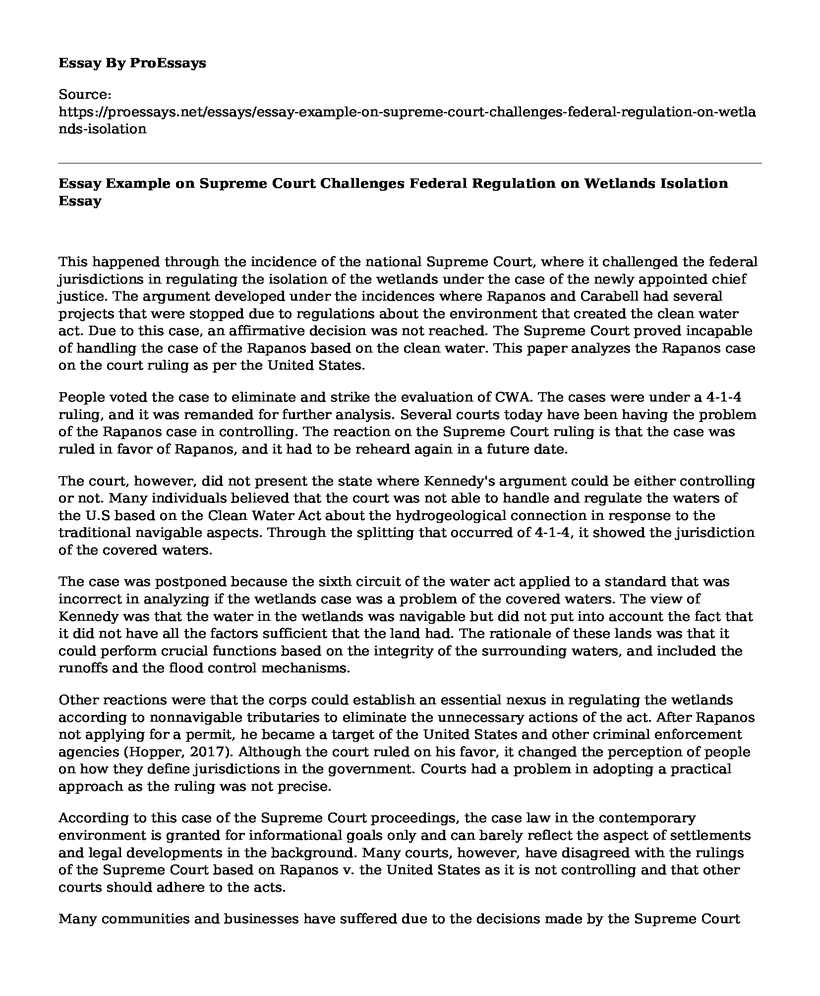This happened through the incidence of the national Supreme Court, where it challenged the federal jurisdictions in regulating the isolation of the wetlands under the case of the newly appointed chief justice. The argument developed under the incidences where Rapanos and Carabell had several projects that were stopped due to regulations about the environment that created the clean water act. Due to this case, an affirmative decision was not reached. The Supreme Court proved incapable of handling the case of the Rapanos based on the clean water. This paper analyzes the Rapanos case on the court ruling as per the United States.
People voted the case to eliminate and strike the evaluation of CWA. The cases were under a 4-1-4 ruling, and it was remanded for further analysis. Several courts today have been having the problem of the Rapanos case in controlling. The reaction on the Supreme Court ruling is that the case was ruled in favor of Rapanos, and it had to be reheard again in a future date.
The court, however, did not present the state where Kennedy's argument could be either controlling or not. Many individuals believed that the court was not able to handle and regulate the waters of the U.S based on the Clean Water Act about the hydrogeological connection in response to the traditional navigable aspects. Through the splitting that occurred of 4-1-4, it showed the jurisdiction of the covered waters.
The case was postponed because the sixth circuit of the water act applied to a standard that was incorrect in analyzing if the wetlands case was a problem of the covered waters. The view of Kennedy was that the water in the wetlands was navigable but did not put into account the fact that it did not have all the factors sufficient that the land had. The rationale of these lands was that it could perform crucial functions based on the integrity of the surrounding waters, and included the runoffs and the flood control mechanisms.
Other reactions were that the corps could establish an essential nexus in regulating the wetlands according to nonnavigable tributaries to eliminate the unnecessary actions of the act. After Rapanos not applying for a permit, he became a target of the United States and other criminal enforcement agencies (Hopper, 2017). Although the court ruled on his favor, it changed the perception of people on how they define jurisdictions in the government. Courts had a problem in adopting a practical approach as the ruling was not precise.
According to this case of the Supreme Court proceedings, the case law in the contemporary environment is granted for informational goals only and can barely reflect the aspect of settlements and legal developments in the background. Many courts, however, have disagreed with the rulings of the Supreme Court based on Rapanos v. the United States as it is not controlling and that other courts should adhere to the acts.
Many communities and businesses have suffered due to the decisions made by the Supreme Court on the clean water act as it has not provided adequate clarity. Shortly many societies will face a problem if the case is not handled and may affect the case of developing the property. The approach of water pollution and the aspect of the wetlands profoundly changed the Rapanos case decisions.
The government proved that it could not control all the water in the U.S on the concept of Clean Water regulations. The effects of the judicial proceedings continue to affect the contemporary ruling courts. In the near future, better strategies will be implemented to reduce the incompetencies of the Supreme Courts by giving more tasks and jurisdictions to the lower courts. The decisions of the court will cause further uncertainties in the litigation of the future and will have effects on the agricultural environment.
Reference
Hopper, M. R. (2017). Running down the Controlling Opinion in Rapanos v. United States. U. Denv. Water L. Rev., 21, 47. https://heinonline.org/hol-cgi-bin/get_pdf.cgi?handle=hein.journals/udenwr21§ion=8
Cite this page
Essay Example on Supreme Court Challenges Federal Regulation on Wetlands Isolation. (2023, Apr 24). Retrieved from https://proessays.net/essays/essay-example-on-supreme-court-challenges-federal-regulation-on-wetlands-isolation
If you are the original author of this essay and no longer wish to have it published on the ProEssays website, please click below to request its removal:
- Constitutional Amendments
- Paper Example - Procedure for Photographing a Crime Scene
- Is It Misleading to Label a Crime as "Victimless" Essay
- Literary Analysis Essay on Iphigenia in Orem
- Essay Example on Terrorism: Destroying Lives and Causing Injury for Change
- Life Skills Training & Reducing Criminal Justice Involvement - Research Proposal
- Essay Sample on Police Presence in Sentinel City: Crime Rates by Neighborhood







